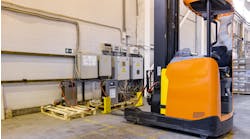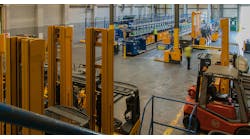The U.S. is a litigious society, oftentimes to a fault. That’s why I don’t enjoy reading about big multi-million dollar judgments against companies that come as a result of ambulance-chasing lawyers who thrive on arcane technicalities. Nevertheless, when I read today that the Occupational Safety and Health division of the North Carolina Department of Labor stuck Norton Creek Farms of Franklin, N.C., for “two alleged serious violations,” and that the fine amounted to $8,400, I thought that seemed like a cheap price for a human life.
The Black Mountain News quoted a state labor department official as saying that the maximum penalty for each serious violation is $7,000, and that the General Statutes say that the Labor Department has to take into consideration various factors such as the gravity of the violation, the size of the business, the good faith and cooperation of the employer, and the history of previous violations.
The victim in this case, Bobby Ammons, died August 2nd. The judgment was just announced. Ammons was a produce worker who was overcome by exposure to carbon monoxide spewed by a forklift. He was actually one of two workers loading produce from inside a cooler building into the back of a semi-trailer. The trailer was backed into a loading dock, so ventilation was poor or non-existent.
After reading this account and learning the judgment, aside from the seemingly low penalty, I was struck by the fact this company used LPG forklifts around food, especially under these conditions. I contacted someone I’ve come to know from our previous coverage of forklift-related fatalities—David Hoover, president of Forklift Training Systems. He saw the same account I did and had time to do some thinking about it.
First, with regard to the judgment in the low-thousands, he seemed to agree with my opening statement about our litigious nature, saying we’ve come to expect huge judgments in the millions where death is involved.
“In court cases it works that way, the more you suffer the higher the verdict, but that is not at all the way OSHA works,” Hoover said. “They have a fixed system, certain types of fines, such as repeat, willful, serious and other than serious. I doubt this is a repeat, and it’s very doubtful it was willful unless they knew about all this in advance and did nothing, and it is not other than serious, so that only leaves a serious citation. Serious citations carry a max of $7,000 no matter if you sprained a muscle or died. That is not a factor. OSHA has to play the hand they were dealt.”
As to the propriety of using LPG trucks around produce, Hoover wisely observed that LPG trucks—especially newer models—that are properly maintained and monitored should present little to no problems in such an environment.
“Years ago we had far more issues as the engines were higher in emissions and the focus on maintaining them was not good,” he said.
When there are fatalities, it’s usually because these trucks are either poorly maintained, a company uses way too many trucks in an area, or, as was the case here, they were using them in a very confined space like a trailer or cooler for long periods of time. One thing did surprise Hoover, however.
“There never should be two people inside a trailer when a forklift is loading it, so that sends up a red flag to me,” he added. “They may also have been doing inventory or something else that allowed the emissions to accumulate inside, but they could have shut the forklift off when doing it and stopped that from happening. I bet we don’t have the whole story.”
He’s right. I called Neal O'Briant, public information officer for the N.C. Department of Labor, and I asked if he knew whether this company was being pursued for any other judgments, either by Federal OSHA or by the family of the deceased. He didn’t know about the family situation, but since this happened in August, he wouldn’t be surprised if the family has already contacted a lawyer. As far as Federal OSHA, his agency has an agreement with the Fed that the state takes precedence. Makes sense, since his agency has more inspectors to throw at the situation. But as far as the size of the judgment in this case, he made this point clear:
Fines are issued to penalize the offending employer but also to get the attention of other employers with similar work environments. My take is that in his region many employers are small and in this economy, even a few thousand dollars can be a debilitating price to pay for anything—even a life.
My suggestion: profit from their price by making sure your lift trucks are up-to-date, both in their technology and in their maintenance. And if you use LPG trucks, make sure your work environment is well ventilated—no matter how new or well maintained your vehicles are.


